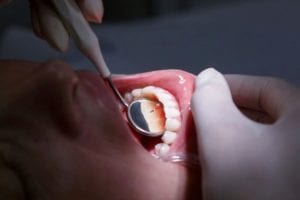
If you think dental care is only about your teeth, think again. In this blog post, we are going to focus on periodontal health (your gums!) and what you can do to keep them healthy.
Why do you need to take care of your gums? For one, they are what is holding your teeth in place. And like your teeth, gums come in contact with a lot of food, liquid, and bacteria throughout the day. When bacteria build up in the gums, you may develop gingivitis. This can quickly lead to periodontal disease, which affects not only the gums, but also the rest of the structures around your teeth, including bones and ligaments.
Symptoms of periodontal disease include:
- Consistently bad breath
- Red, swollen, tender, or bleeding gums
- Pain while chewing or brushing
- Receding gums (teeth appear longer or larger)
- Loose teeth
Periodontal disease can lead to your teeth falling out. Although research is still being done, links have been investigated between periodontal disease and other health issues, like heart and respiratory diseases, diabetes, blocked arteries, and more.
Periodontal Disease Prevention

Making gum and oral health a priority are crucial to preventing gingivitis and periodontal diseases. Things like hormonal changes, genes, and taking certain medications can also put you at a higher risk for gingivitis and periodontal disease, but everyone should take caution.
What can you do to prevent periodontal disease?
Quit Smoking: If you smoke, you are twice as likely to develop a gum disease as a nonsmoker. Smoking not only introduces more bacteria into your mouth, it also weakens your immune system. In other words, once you have gum disease or infections, smoking makes it harder for your mouth to heal.
Bottom line: if you want to avoid gum disease, quit smoking. And don’t think switching over to smokeless tobacco will solve your problems – tobacco in any form is dangerous for your gums.
Visit the Dentist Regularly: The symptoms of gum disease can sneak up on you. After all, how often are you checking your mirror for swollen gums? Visiting a dentist at least twice a year (and getting full dental x-rays when recommended) will offer you a professional opinion on your risk for gum disease and whether any symptoms are present.
Brush with a Dry Brush First: Most peole don’t know this, but many believe you should softly brush your teeth with a dry brush. The results from a recent study show that this method can help to reduce plaque by 67%. It also helped to reduce cases of bleeding gums by 50%.
Brushing and Flossing: These two tips should be obvious. After dry brushing, continue to brush your teeth with toothpaste. Brushing motion should not be too hard, but should cover the teeth, gums, the roof of the mouth, and the tongue. Forgetting any of these areas leaves bacteria to grow and infect your mouth.
And remember to floss as your last step. Flossing disturbs and removes bacteria that toothbrush bristles cannot reach.

Rinse after Eating: We can’t always brush after every meal, but a quick rinse with water can help to remove food particles and reduce bacteria by 30%.
Visit the Orthodontist: If your teeth are crowded or misaligned, it may be hard for your toothbrush or floss to reach all the areas where bacteria may grow. Consider visiting an orthodontist and discussing ways to straighten or balance your smile. Not only will these procedures have cosmetic benefits, they will also give you a better chance at avoiding oral health issues in the future.
Think About Your Sugar Intake: Sugar is a huge factor in many oral health issues. Sugar should be consumed in minimal quantities, and when it is consumed, it should accompany a full meal. When you do eat sugar, make sure you brush your teeth afterward to prevent bacteria from remaining in your mouth.
When trying to avoid sugar, remember that high amounts of sugar are present in many fruit juices.
Helpful Tip: Balance your morning orange juice with drinks like milk or water.
Get Enough Vitamin C: It is important to make sure you get the proper amount of vitamin C in your diet. Among other things, a deficiency in vitamin C can lead to bleeding gums.
Drink Water Throughout the Day: Drinking water is especially important because it creates saliva. This helps to reduce inflammation and weakens toxins that plaque and bacteria create in your mouth. It is commonly recommended that you drink eight glasses of water a day.
If you believe you are developing an oral disease or would like to check in on your oral health, make an appointment with South Florida Dental Care today.






